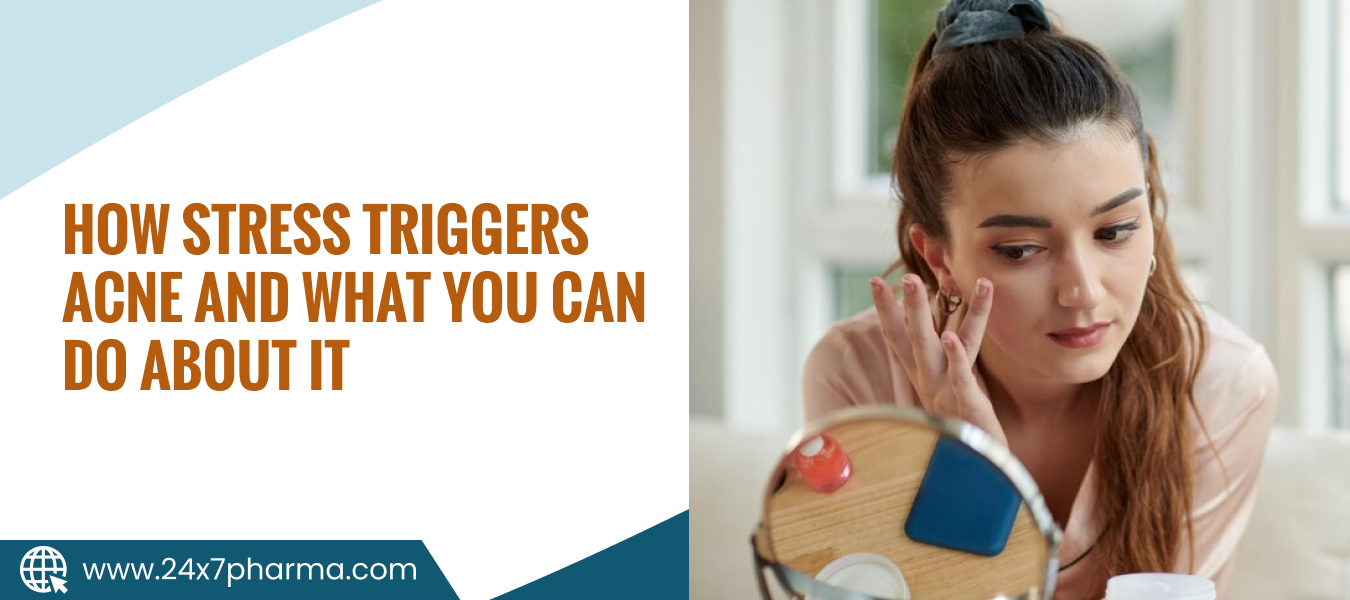Have you ever noticed a fresh breakout appearing just before a big exam, a job interview, or a stressful life event? You’re not imagining things. Science confirms that stress can trigger or worsen acne—and knowing how and why can help you break the cycle.
In this article, we’ll explore the connection between stress and acne, the mechanisms behind stress-induced breakouts, and proven strategies to manage both your mind and skin.
The Science: How Stress Affects Your Skin
When you feel stressed, your body releases a hormone called cortisol—often referred to as the “stress hormone.” Cortisol is part of your body’s fight-or-flight response, but when it stays elevated over time, it disrupts various biological functions, including your skin health.
🔬 1. Hormonal Imbalance and Oil Production
Cortisol stimulates your sebaceous glands to produce more oil (sebum). While some oil is necessary to keep your skin moisturized, excess sebum clogs pores, traps dead skin cells, and creates the perfect environment for acne-causing bacteria to thrive.
🔬 2. Increased Inflammation
Stress activates inflammatory pathways in your body. Chronic inflammation affects the skin’s immune response, making it more prone to red, swollen, and painful pimples—especially in people already predisposed to acne.
🔬 3. Weakened Skin Barrier
Prolonged stress can compromise your skin barrier, reducing its ability to retain moisture and protect against environmental damage. As a result, your skin becomes more sensitive and reactive to irritants, leading to breakouts and flare-ups.
What Stress-Related Acne Looks Like
Stress acne often appears around the jawline, cheeks, or chin. Unlike hormonal or cystic acne, stress acne can vary from whiteheads and blackheads to inflamed pustules. These breakouts tend to worsen during high-stress periods and may be resistant to your usual skincare routine.
Read More : The Ultimate Acne Guide: Causes, Treatments & Prevention
Everyday Habits That Worsen Stress Acne
During stressful times, many people unknowingly adopt behaviors that contribute to skin problems:
- Touching or picking at pimples, which introduces bacteria and causes scarring.
- Skipping skincare routines due to fatigue or distraction.
- Unhealthy coping mechanisms like poor diet, alcohol consumption, or smoking.
- Overwashing or using harsh products in an attempt to “clean” acne-prone skin, which backfires by stripping natural oils and causing more breakouts.
How to Break the Stress-Acne Cycle
The good news? Stress acne is manageable with a balanced approach that treats both mental stress and skin inflammation. Here’s how to take control:
🧘 1. Reduce Stress Naturally
- Practice mindfulness or meditation for 10–15 minutes daily to lower cortisol levels. Apps like Headspace or Calm can be helpful.
- Exercise regularly to release endorphins, boost blood flow to the skin, and reduce anxiety.
- Improve your sleep hygiene by setting a regular bedtime, avoiding screens before bed, and creating a calming nighttime routine.
🧴 2. Adjust Your Skincare Routine
During stressful periods, stick to a simple, non-comedogenic routine that soothes rather than irritates your skin:
- Use a gentle cleanser that doesn’t strip natural oils.
- Apply a lightweight, oil-free moisturizer to keep your skin hydrated.
- Choose products with calming ingredients like niacinamide, green tea extract, or aloe vera.
- Avoid abrasive exfoliants, alcohol-based toners, or multiple active ingredients at once.
🍎 3. Eat a Skin-Friendly Diet
What you eat impacts your skin. To reduce stress-induced inflammation:
- Include omega-3 fatty acids (salmon, chia seeds), vitamin C-rich fruits, and leafy greens.
- Limit sugar, dairy, and ultra-processed foods that may worsen acne.
- Stay hydrated with water and herbal teas to support detoxification and skin clarity.
When to See a Dermatologist
If your acne becomes persistent, painful, or cystic, it’s time to consult a professional. A dermatologist can:
- Prescribe topical or oral medications tailored to your skin.
- Recommend stress-adapted skincare products or treatments.
- Refer you to a mental health provider if stress is affecting your overall health.
Combining dermatological care with mental health support creates a holistic solution that addresses the root cause and the visible symptoms.
Final Tips: Regain Control Over Your Skin and Mind
- Create a consistent skincare routine that feels like self-care, not a chore.
- Track your stress levels and breakouts in a journal to identify patterns.
- Build a support system, whether it’s a therapist, a close friend, or an online skincare community.
✅ Key Takeaway
Stress doesn’t just weigh on your mind—it shows up on your skin. By understanding the connection between stress and acne, you empower yourself to make smarter choices for both your emotional well-being and complexion.
With the right combination of self-care, skincare, and expert support, you can keep stress in check and reveal healthier, clearer skin from the inside out.
🔍 FAQs
- Q. Can stress cause sudden acne breakouts?
A spike in cortisol can lead to increased oil production and inflammation, triggering breakouts within days. - Q. How long does stress acne last?
Stress acne may persist as long as the underlying stress remains unaddressed. Reducing stress often improves skin within 2–4 weeks. - Do meditation and yoga help with acne?
Yes, both reduce cortisol and inflammation, which can help clear stress-related acne over time.

